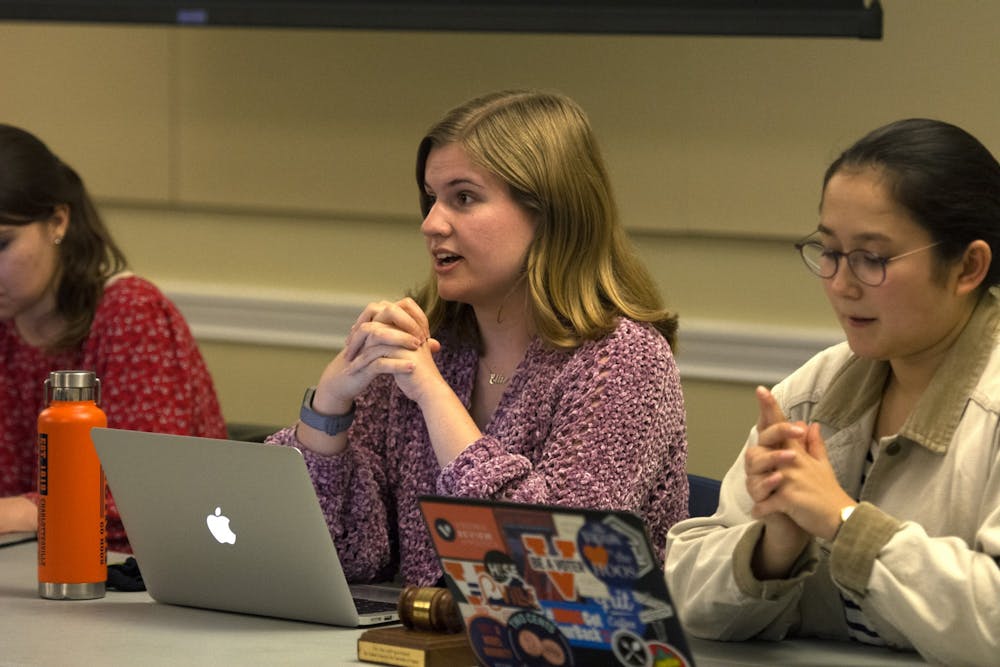As the University’s fall semester comes to an end, Student Council looked back on its initiatives this past semester and the improvements it wishes to make in the coming year.
This past fall, the Student Council Representative Body passed 24 pieces of legislation, six of which involved significant policy change. Some of these significant bills included a bill to create an ad-hoc committee to create an online handbook for Transfer Student Resources, a resolution in support of adopting the New College Curriculum and a resolution calling on the University to provide free STI testing.
The resolution denouncing the University’s practice of providing additional review to applicants of “institutional interest” — passed Dec. 2 — marks a decisive stance by the Representative Body in condemning the University’s use of a “watchlist.”
“I think we've done so many good things this semester,” said Ellie Brasacchio, Student Council president and a fourth-year College student. “The first thing that comes to mind is the conversation that we have had surrounding the watchlist and admissions practices at U.Va. — I think that has sparked a larger conversation on Grounds about certain admissions policies, and I'm really grateful that the Representative Body finally took a stance on that issue.”
When The Cavalier Daily reported in September that the watch list doubled in the most recent admissions cycle since it was first revealed in 2017 by The Washington Post, the Student Council voted on, but failed to pass a resolution in October denouncing the University’s use of a watchlist for “high priority” applicants. The resolution also called on the University to abolish this practice.
Following the failed resolution, the Representative Body contacted administrators and learned that the University’s use of a watchlist had shifted after 2017. What used to be a concrete watchlist had become a more opaque system of endorsements. Despite there no longer being a formal watchlist, the Representative Body condemned, on principle, this practice of giving a second review to applicants on the basis of connections to donors.
Each of the 13 Committees within the Presidential Cabinet of the Student Council cited significant accomplishments this semester as well.
The Arts Committee, which seeks to support students wishing to engage in the arts, had a record number of applicants for their Student Art Fund. This fund allows student artists — including musicians, dancers and actors — to receive funding for independent projects. They also partnered with the Fralin Museum of Art to host a pumpkin decorating event.
The Financial Accessibility Committee, which was created this year, has also set the stage for numerous initiatives.
“They have really laid the groundwork for some really great projects that will be coming up next semester,” Brasacchio said.
Some of its initiatives in progress include publishing the “Guide to Being Not-Rich at UVA,” reducing the price of textbooks at the University and supporting the Next Steps fund — which is aimed at providing a full reimbursement to students for their first two mental health appointments outside of Counseling and Psychological Services.
Brasacchio added that the Graduate Affairs Committee has also been active this semester, sponsoring a tour of Central Grounds in an effort to increase graduate student understanding of the University’s history. The Committee also co-sponsored a graduate student reception with Associate Dean of Students F. Aaron Laushway for Lighting of the Lawn — and plans to establish a food pantry on North Grounds near the Law and Darden schools.
“The Graduate Affairs Committee, which hasn't been active for a long time now, has a great chair,” Brassachio said. “He’s been working with graduate professional school Council President, and we'll hopefully see a food pantry on the North Grounds next year.”
According to Tre Tennyson, chair of the Graduate Affairs Committee, the goal of this initiative is to ensure that every graduate student is able to access food and other items supporting their overall well-being, regardless of income.
“This initiative will of course be an ongoing conversation between Student Council and the graduate student body, as we seek to understand better what those needs may be, and we welcome any suggestions students may have about what items they wish to see included in their food pantry,” Tennyson said.
Brasacchio noted that one of the biggest challenges within Student Council is getting new members integrated into the organization and dealing with training and transition time.
“Just by the nature of it being a student organization in college, there's a lot of turnover from year to year, and oftentimes that results in more and more time needing to be spent just figuring out what they need to do in their roles,” Brasacchio said. “Going forward, we're trying to minimize that transition time with leadership training. If we can minimize the time needed on the onset, we can jump straight into projects.”
Brasacchio also hopes that moving forward, Student Council can improve upon the feeling of members being part of a broader organization.
“We have about 350 members in Student Council, so there's never really a time where all 350 members come together, and there's a tendency for members to feel more attached to their individual committees than the organization as a whole,” Brasacchio said. “We think that if those members feel more attached to the organization, they're more likely to continue on in Student Council.”







